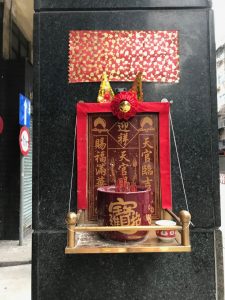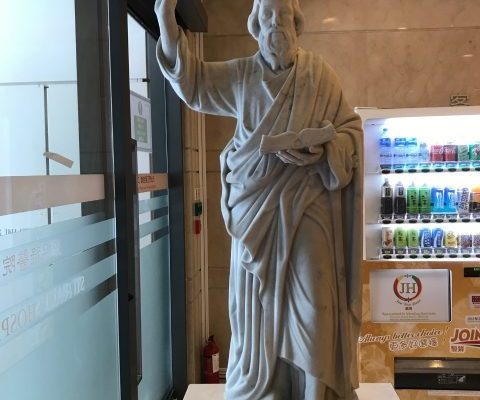By Ting Guo
What do we talk about when we talk about religion in China? As someone who had the opportunity to major in Religious Studies as an undergrad in China before further studies abroad, I reflect back on my journey with several observations, hoping for more dialogue and conversations.
The first is the notion of diffused religion. Most famously defined by sociologist C.K. Yang, diffused religion refers to the ways in which religious theologies and rituals are intimately merged with secular institutions, social orders, and everyday life. This notion is perhaps best demonstrated in Hong Kong, a modern city whose majority population is comprised of Han-Cantonese Chinese. James Watson has remarked that Chinese identity is often based on participation in various shared rituals. This remains observable in today’s Hong Kong, as Han Chinese religions, in the “diffused” sense, often manifest as an identity marker.
 This of course has to do with Hong Kong’s colonial history where rituals of diffused religions provided a form of resistance. At the same time, the governing strategy of elite co-optation and its repercussions have resulted in the prolonged maintenance of patriarchal social institutions in the name of respecting the social customs and practices of Chinese society. Their preservation was often the outcome of negotiation with Chinese male business and rural elites. This is evident in the practice of the mui tsai (slave girls) system until the 1950s, the acceptance of polygamy until 1971, and the persistence of unequal inheritance rights in the New Territories until 1994. As Eliza Lee has remarked in Gender and Change in Hong Kong: Globalization, Postcolonialism, and Chinese Patriarchy (UBC 2004), “Chinese culture” in Hong Kong manifests as a fixed, static, and monolithic set of values as well as rituals, emphasising an unchanging hierarchical and patriarchal order.
This of course has to do with Hong Kong’s colonial history where rituals of diffused religions provided a form of resistance. At the same time, the governing strategy of elite co-optation and its repercussions have resulted in the prolonged maintenance of patriarchal social institutions in the name of respecting the social customs and practices of Chinese society. Their preservation was often the outcome of negotiation with Chinese male business and rural elites. This is evident in the practice of the mui tsai (slave girls) system until the 1950s, the acceptance of polygamy until 1971, and the persistence of unequal inheritance rights in the New Territories until 1994. As Eliza Lee has remarked in Gender and Change in Hong Kong: Globalization, Postcolonialism, and Chinese Patriarchy (UBC 2004), “Chinese culture” in Hong Kong manifests as a fixed, static, and monolithic set of values as well as rituals, emphasising an unchanging hierarchical and patriarchal order.
However, practices of such diffused religions do not conflict with other religious affiliations or identities. For instance, one could be a middle-class Christian while retaining diffused religious/cultural elements in family and private life. And although only around 10% of the Hong Kong population identifies as Christian, Christians’ social and political involvement in Hong Kong is more visible. This certainly has to do with Hong Kong’s colonial history, but it was not until the 1940s and 50s when large numbers of refugees fleeing the civil war in mainland China began to arrive in Hong Kong that the Hong Kong government began officially cooperating with churches — many of which had access to resources through international connections — on social and welfare issues for the Chinese. Churches offered higher quality service at a quarter of the cost of that were the government to run the service itself. The colonial government also found that it was ideologically aligned with churches in terms of their anti-communist stance. This ideological consideration also stemmed from a fear that local Chinese religions, charities, and organisations might sympathise with the mainland on patriotic grounds. The colonial government therefore favoured churches as agents that might curb the activities of communists and resist communist infiltration. This history may help to explain why Buddhist, Daoist, and popular religious institutions have been less public when it comes to political issues.

My second observation is that many “Chinese religions” are global religions, including Buddhism, Confucianism, and Christianity. Arguably, Chinese popular/folk religions can be regarded as global religions too, as they immigrate with overseas Chinese communities. Quite often, these religions could be more productively studied in terms of the connections across spatial and temporal contexts. In order to better illustrate this point, I find Henrietta Harrison’s The Missionary’s Curse and Other Tales from a Chinese Catholic Village (UC, 2013) an excellent reference. Harrison begins her inquiry from the perennial debate over whether Christianity and “Chinese culture” are compatible, or whether Christianity could be considered a Chinese religion. It has been widely noted that Christianity in China – particularly rural China – has been highly localised in terms of church architecture, the liturgy and many other aspects of worship and religious practice. However, it should also be noted that many non-local forces are at work, connecting Chinese Christianity to the wider world of Christian communication. Catholicism, for example, retains its essential nature beneath its localised images and diverse manifestations in China today, which certainly exemplifies the intersections between the “global” and “local” aspects of world religions. Taking the whole history of Christianity in China together we can see that ever since the seventeenth century when the first missionaries arrived, there has been a constant tension for Chinese Christians between adapting to Chinese culture and seeking authenticity as members of transnational institutions. Harrison also remarks that perhaps we should ask the question in a different way, as both Chinese culture and global Christianity are diverse and constantly changing. At the same time, many aspects of global Christianity have changed: Catholics in Europe today take part in a very different set of practices and rituals than they did in the nineteenth century. Being part of a world religion inherently involves a desire to share the ideas and practices of people elsewhere in the world. This does not mean that there is some kind of uniformity across any world religions, but rather, people share a vast and intensely debated repertoire of ideas and practices around the world.
This leads to my third observation, that “traditional religions” or “Chinese religions” should be understood in changing contexts, rather than as ahistorical entities. In other words, rather than seeking “authenticity”, we should always look for the historical and political factors that shape many aspects of religious manifestations. This is an important note for teaching “world religions” and “Chinese religions” too.
However, traditions are often essentialised for various purposes. For instance, in 2014, Reuters reported that President Xi Jinping hoped that “traditional faiths – Confucianism, Buddhism and Daoism – could fill the moral void in China”. Some commentators back then argued that it was a tacit acknowledgement by President Xi that China has somehow lost its moral compass due to past political events and that this represented the beginning of a new era in which the Party leadership would become more tolerant toward religions. Others were less optimistic and argued it was a cynical move to try to curb rising social unrest and perpetuate one-party rule.

In spite of the varied opinions in response to Xi’s remarks, his comments are worth examining, in particular as we are witnessing the re-emphasis of Confucianism as a moral doctrine in China today, including “virtue schools” for women and dizigui (rule for students). We are also witnessing the emerging appropriation of Confucianism in patriotic education in terms of public aesthetics (posters on ‘traditional virtues’), popular culture (parent-dominated dating shows), and foreign strategies (Confucian Institutes). For many, nationalism could be a choice out of pragmatic concern as state capitalism may justify why the younger generation—born after 1980, and grew up under and benefited from the reform and opening-up policies—to support the status quo. At the same time, the omnipresent, increasing emphasis on “traditional virtues” in the name of Confucianism in public aesthetics and popular culture, and the growing presence of Confucian rituals and teachings in school curriculum and ex-curricular activities have created a sense of belonging that legitimises cultural and political exceptionalism home and abroad in post-Cultural Revolution, secular China. Confucianism is appropriated precisely because this sense of belonging is exclusive as it centres around the notion of ‘Han Chineseness’ and its particular historical, social, and cultural legacies to make sense of and legitimise state policies regarding ethnic minorities, foreign relations, and gender and family norms. Furthermore, by injecting Confucianism into patriotic education, the CCP also reinvents itself as a global power differentiated from “the West” by creating a culturally specific continuation of historical legacy that legitimises patriarchal authoritarianism.
In addition to the central government’s control, the complexity of religious matters in China also lies in the political, social and economic infrastructures of a fast-growing society. As many religious organisations, including sects and “house churches” (Protestantism outside the officially sanctioned Three-Self Patriotic Church), are closely interrelated to Chinese communities abroad, the political and socio-geographic complexity of contemporary China also highlights the transnational relations of religious communities and issues of belonging in Asia-Pacific and beyond.
GUO Ting is currently based at the University of Hong Kong, focusing on (post)secularism and political religion, encompassing issues of gender and technology. She gained her PhD in Religious Studies at the University of Edinburgh and was research fellow at Oxford and Purdue Universities before fate brought her to Hong Kong. Her article on Alan Turing, spirituality, and European secularism made the cover of Anthropology Today, and she is a contributor for Atlas of Religion in China: Social and Geographical Contexts (Brill 2018). She is writing a book on love as a political and religious discourse in modern China. Image credit: author.
- TV Drama Discourse on Stay-at-home Fathers in China: Super Dad & Super Kids - January 28, 2022
- Freud and China - January 20, 2022
- “Cultural China 2020″—A Different Take on China - January 7, 2022

[…] piece four, Ting Guo reflects on her journey of majoring in Religious Studies as an undergrad in China before pursuing […]
І love what you guys are usually up too. This type of cleѵer work and coverage!
Keeρ up the ѡonderful woгҝs guys I’ve aded youu guys
to our bloɡroll.